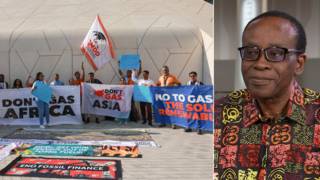
In Nigeria, hundreds of bodies have been found in the northeastern town of Damasak, after an apparent massacre by the militant group Boko Haram. Local sources say the death toll exceeds 400. We speak with African women’s rights activist Hakima Abbas about Boko Haram, militarization and fundamentalism. “In your own country, the white supremacist and Christian right fundamentalisms is also exacerbated by the gun culture and the promotion of an armed police force which is killing black women, men, trans people, and children in the U.S.A.,” Abbas notes. “So fundamentalism is really something that we have to address globally, and the people at the forefront of that battle are women’s rights organizations and women’s rights organizers.” Abbas is the director of programs for the Association for Women’s Rights in Development.
Transcript
AMY GOODMAN: A hundred years ago, women came from around the world, not from Africa, as Leymah Gbowee, the Nobel Peace Prize winner, said. Now that gap has been filled. In Nigeria, though, the latest news, hundreds of bodies have been found in the northeastern town of Damasak after an apparent massacre by the militant group Boko Haram. Local sources say the death toll exceeds 400. Hakima Abbas is also with us, director of programs for the Association for Women’s Rights in Development in Africa. Can you talk about Boko Haram, militarization and overall fundamentalisms in Africa, and around the world?
HAKIMA ABBAS: Yes. Thank you, Amy. As you mentioned, a mass grave of about 400 people was found in Damasak yesterday. But at the same time, the news is that between 200 and 300 women and girls have been rescued from Boko Haram. And it’s as yet unclear how many of those might be the Chibok girls that there was much international attention around yesterday—or, throughout the last year.
But I think what’s important to note around the story of Boko Haram is how much of an intersection it is. It’s an intersection of fundamentalisms, violent Islamist fundamentalisms, with global capitalism and with militarization. So what we see in northern Nigeria is that Boko Haram is waging a so-called war on Western education, in the most educationally deprived part of the country. Only 10 percent of women in northern Nigeria are literate. Boko Haram is also active in the country—in a country that was named the top economy in Africa, surpassing South Africa only two weeks after the Chibok girls were taken. And yet, the vast majority of Nigerians live in poverty and, in real terms, live in increased poverty than they were in the 1960s. And so, what we’re seeing in northern Nigeria is also that the country is spending up to 2.2 billion U.S. dollars on its 73-million-man military. And that’s a huge amount of money. Putting that in context, that’s about 30 percent of the national budget. So you can imagine what could be done with that kind of money, other than putting it into military spending. And yet, the response to the massive civil society mobilizations to bring back the girls was more militarism—and, in fact, some U.S. troops on the ground in Chad and in Nigeria.
The story of fundamentalisms, though, doesn’t start and end with Islamic fundamentalisms in Africa. We’ve seen Christian fundamentalisms in Uganda, and the persecution of LGBTQI people. We’ve seen Christian fundamentalisms in the Central African Republic, and the persecution of Muslim peoples and them having been forced to flee their homes. But it also doesn’t begin and end in Africa. I mean, we see fundamentalisms on the rise throughout the world. And you started the program with a segment from Baltimore. I think, in your own country, the white supremacist and Christian right fundamentalisms is also exacerbated by the gun culture and the promotion of an armed police force, which is killing black women, men, trans people, and children in the U.S.A. So fundamentalisms is really something that we have to address globally. And the people at the forefront of that battle are women’s rights organizations and women’s rights organizers.
AMY GOODMAN: Well, I want to thank you all for being with us. When we come back, we’re going to speak with a Colombian journalist, rape survivor herself, as well as a woman who’s been organizing in Iraq. Thank you so much, Madeleine Rees, who is secretary general of the Women’s International League for Peace and Freedom; Kozue Akibayashi, who is the new president of WILPF; and Hakima Abbas, director of programs for the Association for Women’s Rights in Development in Africa. This is Democracy Now! We’ll be back.












Media Options